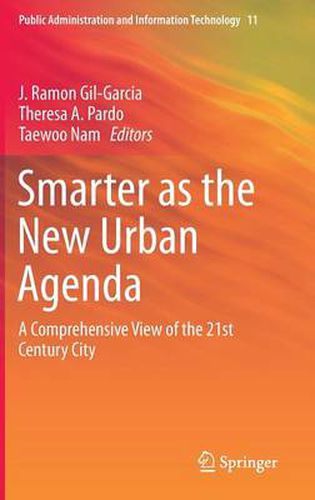Readings Newsletter
Become a Readings Member to make your shopping experience even easier.
Sign in or sign up for free!
You’re not far away from qualifying for FREE standard shipping within Australia
You’ve qualified for FREE standard shipping within Australia
The cart is loading…






This title is printed to order. This book may have been self-published. If so, we cannot guarantee the quality of the content. In the main most books will have gone through the editing process however some may not. We therefore suggest that you be aware of this before ordering this book. If in doubt check either the author or publisher’s details as we are unable to accept any returns unless they are faulty. Please contact us if you have any questions.
This book will provide one of the first comprehensive approaches to the study of smart city governments with theories and concepts for understanding and researching 21st century city governments innovative methodologies for the analysis and evaluation of smart city initiatives. The term smart city is now generally used to represent efforts that in different ways describe a comprehensive vision of a city for the present and future. A smarter city infuses information into its physical infrastructure to improve conveniences, facilitate mobility, add efficiencies, conserve energy, improve the quality of air and water, identify problems and fix them quickly, recover rapidly from disasters, collect data to make better decisions, deploy resources effectively and share data to enable collaboration across entities and domains. These and other similar efforts are expected to make cities more intelligent in terms of efficiency, effectiveness, productivity, transparency, and sustainability, among other important aspects. Given this changing social, institutional and technology environment, it seems feasible and likeable to attain smarter cities and by extension, smarter governments: virtually integrated, networked, interconnected, responsive, and efficient. This book will help build the bridge between sound research and practice expertise in the area of smarter cities and will be of interest to researchers and students in the e-government, public administration, political science, communication, information science, administrative sciences and management, sociology, computer science, and information technology. As well as government officials and public managers who will find practical recommendations based on rigorous studies that will contain insights and guidance for the development, management, and evaluation of complex smart cities and smart government initiatives.
$9.00 standard shipping within Australia
FREE standard shipping within Australia for orders over $100.00
Express & International shipping calculated at checkout
This title is printed to order. This book may have been self-published. If so, we cannot guarantee the quality of the content. In the main most books will have gone through the editing process however some may not. We therefore suggest that you be aware of this before ordering this book. If in doubt check either the author or publisher’s details as we are unable to accept any returns unless they are faulty. Please contact us if you have any questions.
This book will provide one of the first comprehensive approaches to the study of smart city governments with theories and concepts for understanding and researching 21st century city governments innovative methodologies for the analysis and evaluation of smart city initiatives. The term smart city is now generally used to represent efforts that in different ways describe a comprehensive vision of a city for the present and future. A smarter city infuses information into its physical infrastructure to improve conveniences, facilitate mobility, add efficiencies, conserve energy, improve the quality of air and water, identify problems and fix them quickly, recover rapidly from disasters, collect data to make better decisions, deploy resources effectively and share data to enable collaboration across entities and domains. These and other similar efforts are expected to make cities more intelligent in terms of efficiency, effectiveness, productivity, transparency, and sustainability, among other important aspects. Given this changing social, institutional and technology environment, it seems feasible and likeable to attain smarter cities and by extension, smarter governments: virtually integrated, networked, interconnected, responsive, and efficient. This book will help build the bridge between sound research and practice expertise in the area of smarter cities and will be of interest to researchers and students in the e-government, public administration, political science, communication, information science, administrative sciences and management, sociology, computer science, and information technology. As well as government officials and public managers who will find practical recommendations based on rigorous studies that will contain insights and guidance for the development, management, and evaluation of complex smart cities and smart government initiatives.